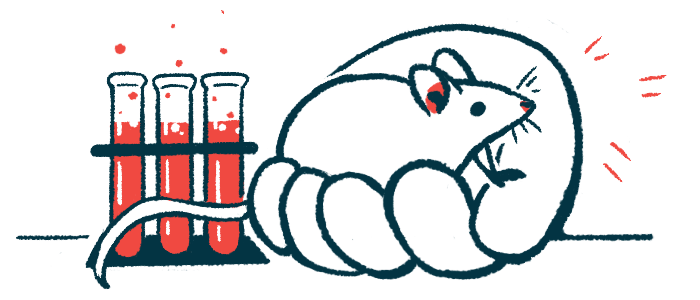Anti-malaria drug shows promise in rat model for treating MG
Dihydroartemisinin, or DHA for short, found to alleviate many MG symptoms
Written by |

The anti-malaria drug dihydroartemisinin, known simply as DHA, showed promise in a rat model of myasthenia gravis (MG) as a potential treatment for the autoimmune disease, a new study reports.
In addition to alleviating many MG-related symptoms, DHA inhibited pro-inflammatory T-cells while boosting immune-suppressing T-regulatory cells. Treatment with the anti-malaria drug also restored the balance of intestinal microbes.
“Approaches that reshape immune and gut microbiota may serve as new strategies for the prevention and treatment of MG,” the researchers wrote, calling the use of DHA “a novel therapeutic approach for the treatment of MG.”
The study, “Dihydroartemisinin ameliorates experimental autoimmune myasthenia gravis by regulating CD4+ T cells and modulating gut microbiota,” was published in the journal International Immunopharmacology.
Scientists searching for new, better treatments for MG
In MG, an abnormal immune response disrupts communication between nerves and muscles, leading to the disease’s hallmark symptoms of muscle weakness and fatigue. Most cases are marked by the production of self-reactive antibodies against acetylcholine receptors (AChRs), proteins on muscle cells that respond to chemical signals from nerves to coordinate muscle contraction.
First-line MG treatment often involves cholinesterase inhibitors, such as Mestinon (pyridostigmine bromide), which boosts the effects of acetylcholine, a chemical signaling molecule released from nerves to trigger muscle contractions. Corticosteroids and other immunosuppressants also can be used to ease symptoms of the rare neuromuscular disease.
Still, many patients do not entirely respond to currently available therapies, and the long-term use of corticosteroids carries the risk of serious side effects.
“The search for new drugs with long-term benefits and fewer side effects is a pressing clinical problem,” wrote the team of researchers, from institutions in China.
DHA is the active metabolite of artemisinin, a naturally occurring compound that, along with its derivatives, is used as a treatment for malaria. Emerging evidence suggests that DHA also has potent anti-inflammatory and immunoregulatory properties.
Here, the team tested DHA in a rat model of MG, called experimental autoimmune MG, or EAMG. A feeding tube was used to give the animals the anti-viral medication at doses of 25 and 50 mg/kg daily for 46 days, or about 1.5 months.
Compared with untreated rats, those in the DHA groups showed improved grip strength, fewer tremors, and the ability to lift their heads off the ground. By day 46, clinical scores were significantly improved in both DHA dose groups. The anti-viral drug also attenuated weight loss in MG rats, with weight scores significantly higher in both treatment groups than in the untreated group.
The search for new drugs with long-term benefits and fewer side effects is a pressing clinical problem. … This [study] suggests that DHA may be a potential candidate for MG therapy.
“These data suggested that DHA has a therapeutic effect on EAMG rats,” the researchers wrote.
Experiments to understand the drug’s mechanism of action found the compound reduced the number of pro-inflammatory immune T-cells (Th1 and Th17) while boosting T-regulatory cells, or Tregs, a type of T-cell that suppress the activity of other immune cells.
Anti-malaria drug helped restore balance to gut microbiome
Recent research shows that MG patients have an altered gut microbiome, the community of bacteria, viruses, and fungi living in the intestines.
A genetic analysis showed that DHA restored the gut microbiome balance in EAMG rats, by lowering the abundance of bacteria such as Ruminococcus, and elevating the numbers of Clostridium, Bifidobacterium, and Allobaculum.
“These results suggested that DHA improved EAMG by altering the gut microbiota,” the researchers noted.
A computer-based analysis identified 103 potential protein drug targets for DHA. Of the top 20 pathways screened, a signaling pathway called PI3K-AKT, which is involved in inflammation, was highly enriched. Molecular simulations suggested that DHA may interact with certain proteins involved in the PI3K-AKT pathway, including AKT1, CASP3, EGFR, and IGF1.
Experiments confirmed that DHA blocked the activation of AKT and PI3K in the spleen tissue of EAMG rats. DHA also reduced the activity of the genes that encode for AKT1 and PI3K.
“This suggested that DHA ameliorated EAMG rats by inhibiting the activation of the PI3K-AKT signaling pathway,” the team wrote.
“We found that DHA exerts a therapeutic effect on EAMG by inhibiting the PI3K-AKT signaling pathway, regulating Th1, Th17 and Treg cells, and modulating the intestinal flora,” the authors concluded. “This suggests that DHA may be a potential candidate for MG therapy.”




Leave a comment
Fill in the required fields to post. Your email address will not be published.